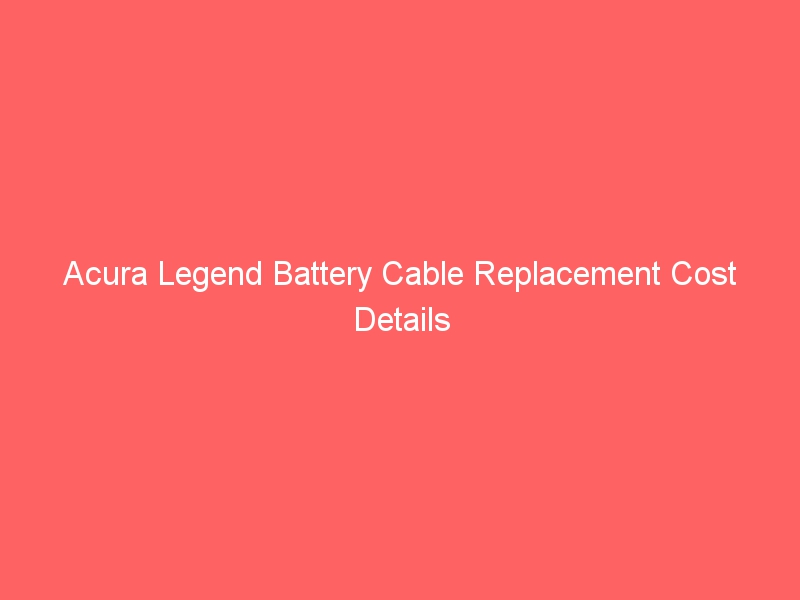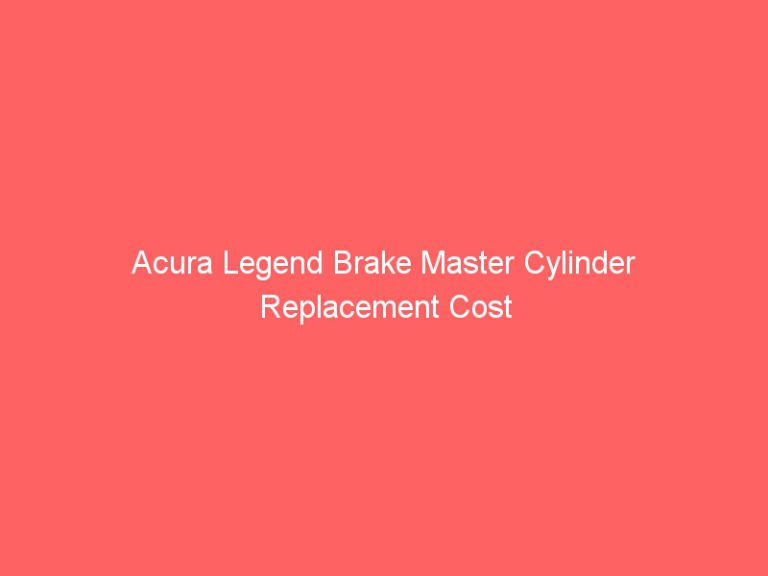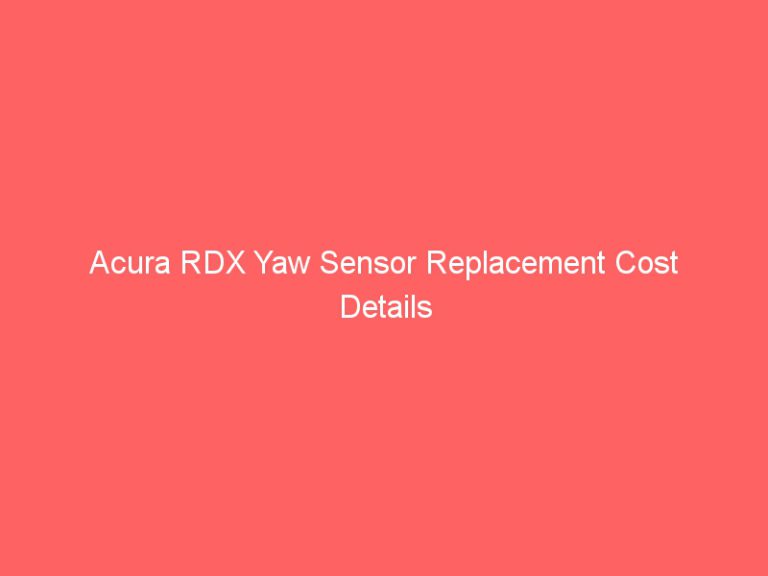Acura Legend Battery Cable Replacement Cost Details
# What’s the Real Acura Legend Battery Cable Replacement Cost? A Detailed Breakdown
The average **Acura Legend battery cable replacement cost** is between **$160 and $175**. This price range provides a reliable estimate for owners of this classic sedan. This figure typically includes parts, priced around $104, and labor costs, which are estimated to be between $56 and $71. It’s important to remember that this range does not include taxes and fees and can vary based on your specific location and the repair shop you choose.
## A Deep Dive into Your Acura Legend Battery Cable Replacement Cost
Understanding the numbers behind your repair bill can give you confidence when speaking with a mechanic. The cost is split between the physical parts and the skilled labor required for the installation.
| Cost Component | Estimated Price Range | Description |
| ——————— | ——————— | ——————————————————————————————————- |
| **Parts Cost** | $104 | This covers the price of new positive and negative battery cables. |
| **Labor Cost** | $56 – $71 | This represents the mechanic’s time for diagnosis, removal of old cables, and installation of new ones. |
| **Estimated Total** | **$160 – $175** | The combined cost before taxes, shop fees, or any additional related repairs. |
*For a more accurate estimate based on your location, use our Fair Price Estimator.*
### How Location Affects Your Repair Bill
Automotive repair costs are not universal across the United States. Labor rates, which are a significant part of the bill, can fluctuate by 20% or more depending on your zip code. A repair in a high-cost-of-living area like San Francisco or New York City will almost certainly be more expensive than the same job in a smaller midwestern town. Always consider getting local quotes to find the most accurate pricing.
### OEM vs. Aftermarket Parts
When replacing parts on your Acura Legend, you have a choice between OEM (Original Equipment Manufacturer) and aftermarket parts.
* **OEM Parts:** Sourced directly from Acura/Honda, these parts guarantee a perfect fit and original quality but come at a premium price.
* **Aftermarket Parts:** Produced by third-party companies, these cables are often more affordable. Reputable brands offer quality comparable to OEM, but it’s crucial to choose wisely to avoid premature failure.
According to automotive experts, using battery cables rated identically to, or larger than, the original factory cables is essential. Using an undersized cable can lead to undercharging, extreme heat, a potential fire hazard, and repeated failures.
## What Factors Change the Final Replacement Cost?
The $160 to $175 range is a great starting point, but several factors can push your final invoice higher or lower.
* **Vehicle Year & Condition:** The Acura Legend was produced from 1986 to 1995. Older models may have significant corrosion not just on the cable ends but also on the mounting points (starter, engine block), which can increase labor time for cleaning and preparation.
* **Shop Type (Dealership vs. Independent):**
* **Acura/Honda Dealership:** Expect the highest labor rates and mandatory use of OEM parts. However, you’re paying for technicians with model-specific expertise.
* **Independent Repair Shop:** Often offers more competitive labor rates and flexibility in using quality aftermarket parts, which can lower the overall cost.
* **Chain Retailers:** Places like Pep Boys or Firestone can be a middle-ground option, but ensure they have experience with older vehicles.
* **Additional Necessary Repairs:** A faulty battery cable can often be a symptom of or a cause for other issues. A mechanic will perform a full starting and charging system test, which might reveal:
* **A Weakened Battery:** The bad cables may have prevented your battery from charging properly, shortening its lifespan. A new car battery typically costs $150-$250.
* **A Strained Alternator:** If the alternator has been working overtime to push a charge through a corroded cable, it may be failing.
* **Corroded Battery Tray or Hold-Downs:** These components may need to be replaced if they’ve been damaged by acid and corrosion.
## The Mechanic’s Perspective: Diagnosis and Replacement Process
Understanding what happens at the shop can demystify the repair process and help you recognize the value you’re receiving.
### How Are Battery Cable Issues Diagnosed?
We have all heard the term “dead battery,” or experienced this issue ourselves, but it is important to note that a “dead battery” does not necessarily mean the battery is at fault. A technician will connect your Acura Legend to a starting and charging system tester. This advanced device automatically tests every part of the system, from the battery to the starter and alternator.
The machine will display results and indicate the possibility of battery cable failure, but a good technician will also perform a thorough visual inspection. They will check for the tell-tale signs of corrosion (white or greenish powder), frayed wires, or loose connections at the battery, starter motor, and chassis ground. If the battery is discharged, it will be recharged and retested before any other diagnostic work continues.
### Step-by-Step: How a Battery Cable is Replaced
Replacing the battery cables on most vehicles is a straightforward process for a trained technician.
1. **Safety First:** The negative battery terminal is always disconnected first to prevent accidental electrical shorts.
2. **Access & Removal:** The technician will remove any battery insulation and the battery retaining bracket. The battery is then removed to provide better access.
3. **Trace & Disconnect:** The old positive and negative cables are unbolted from their connection points—typically the starter solenoid for the positive cable and the engine block or frame for the negative cable.
4. **Surface Preparation:** This is a critical step. The mechanic will use a wire brush to thoroughly clean the battery terminals, starter post, and the chassis ground point to ensure a perfect metal-to-metal connection.
5. **Installation:** The new cables are routed and securely fastened.
6. **Protection:** A terminal protector spray or dielectric grease is applied to the connections to prevent future corrosion.




